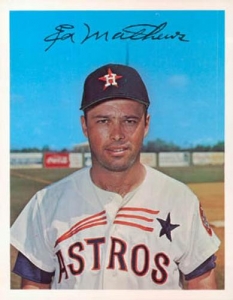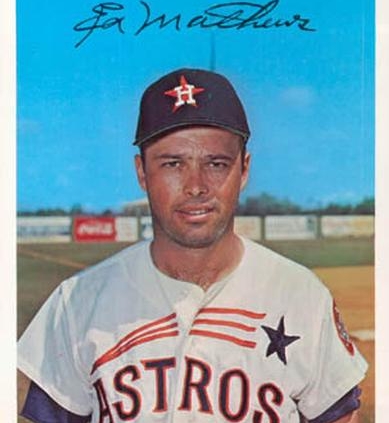July 14, 1967: Astros’ Eddie Mathews joins 500 Home Run Club
 It was a Goliath vs. Goliath situation.
It was a Goliath vs. Goliath situation.
On July 14, 1967, Eddie Mathews smacked the 500th home run of his career — a three-run shot off fellow future Hall of Famer Juan Marichal. The Baseball Hall of Fame inducted Mathews in 1978, Marichal five years later.
Wearing a Houston Astros uniform after a storied 15-year tenure with the Boston-Milwaukee-Atlanta Braves, Mathews entered rarefied territory when he homered over the right-field fence at Candlestick Park. Only six major leaguers were in the 500 club before him: Jimmie Foxx, Mickey Mantle, Willie Mays, Mel Ott, Babe Ruth, and Ted Williams.
Mathews’ highly significant contribution to the 8-6 victory over the Giants provided a moment of glory for the Astros — formerly the Colt .45s (1962 to 1964) — who hadn’t yet completed a season above .500. It was no different in 1967: a ninth-place finish and 69-93 record in the National League.
The left-handed slugger and two-time season leader in home runs had come to Houston in a five-player trade with the Atlanta Braves on December 31, 1966. His tenure with the Braves organization dated back to 1952, the team’s last year in Boston.
Any goodwill between Mathews and the Braves front office evaporated quicker than boiling water turning into steam when he learned about the trade from the press instead of the executive suite. “I’m not only surprised — I’m shocked,” declared the Braves icon, who hit 493 round-trippers playing with Cooperstown-bound teammates including Hank Aaron, Warren Spahn, and Phil Niekro. “It isn’t the trade that shocked me. It’s the way the whole thing was handled.”1
There was a six-day gap between homers 499 and 500.
On July 8, Mathews and Jimmy Wynn each hit a home run in the sixth inning off right-hander Ray Culp; it was the third game of a four-game homestand sweep of the Chicago Cubs. The Astros followed their 3-1 victory with a 6-0 shutout the following day. They were 33-50 going into the All-Star break.
When the second half of the season began, Mathews sat out the first game of the Astros’ 13-game road trip, a 5-4 loss to the San Francisco Giants in 10 innings. The July 14 game was the next one; Astros skipper Grady Hatton placed Mathews batting in the number five slot.
San Francisco led 1-0 on Willie McCovey’s first-inning RBI groundout when Mathews got his first opportunity at number 500 in the top of the second inning. His single off Marichal (whose record to date was 12-7) began the second inning; Norm Miller’s double-play grounder to second baseman Tito Fuentes followed. Bob Aspromonte singled, but Houston’s prospects faded when Dave Adlesh fouled out to McCovey at first.
Fuentes added to the Giants’ margin in the bottom of the third. He led off with a single and a steal, then advanced on an error by Houston right-hander Dave Giusti during a pickoff attempt. Giusti retired Marichal on a groundout to second baseman Joe Morgan and struck out Mays, but gave up a triple to Jim Davenport; Fuentes scored.
Houston responded with three runs in the top of the fourth. Wynn and Staub began with back-to-back singles. Mathews stepped into the batter’s box for the second time in the game. But his strikeout delayed the home-run achievement. Miller’s three-run homer put the Astros ahead 3-2.
The Giants regained the lead in the bottom of the fifth when Davenport’s two-run bash scored himself and Fuentes, who had begun with a single followed by Marichal’s sacrifice and Wille Mays’s strikeout. McCovey’s popout to Sonny Jackson at shortstop ended the brief rally.
Houston’s offense shone like a full moon on a clear Texas night in the top of the sixth inning. Wynn and Staub repeated their fourth-inning feat of consecutive singles to lead off; Mathews joined the 500 club with his three-run round-tripper off the first pitch to him by Marichal, a fastball.2 The blast vaulted the Houston squad to a 6-4 lead. After Mathews, Miller walked and Aspromonte singled. The Dominican Dandy then left the game. Joe Gibbon relieved him and got two outs quickly on Dave Adlesh’s double-play grounder; Miller went to third and scored on Giusti’s triple. Jackson’s groundout to Fuentes ended Houston’s half of the inning.
The Giants added a run in the bottom of the sixth to make the score 7-5. Jim Ray Hart led off with a single and moved to second when Mathews, playing first base, made an unassisted out on Tom Haller’s grounder. Ollie Brown followed with a fly out; Hal Lanier singled home Hart.
Houston added the eighth and final run to the tally in the top of the seventh; Wynn walked and Staub’s double to right scored him from first base.
San Francisco notched its last run when Hart led off the bottom of the eighth with a solo home run.
Mathews’ historic blast overshadowed several outstanding performances on both teams. Staub went 3-for-5 and scored two runs; Wynn scored three times. Fuentes had a 3-for-4 night; Davenport’s 2-for-4 output resulted in three RBIs.
Though Mathews’ achievement was cause for celebration, there was a tinge of vengeance after the game. “I wish it would have come against the Braves,” said the 35-year-old slugger.3
Things got a little bleaker after the victory. Houston went 5-8 in its next 13 games. But the Astros ended July with a seven-game winning streak, which the Mets broke on August 1 in a 5-1 victory against Mathews et al.
Nearing the end of his career, Mathews hit 10 home runs in an Astros uniform. He had hit .238 in 101 games when Houston traded him to Detroit on August 17. Mathews was self-deprecating: “I wish I had done a better job, that’s all. I wasn’t doing anything here for the guys.”4
Though his tenure with Houston didn’t even last till Labor Day, Mathews apparently found the respect with the Astros front office that he couldn’t find in Atlanta.
With the last-place Astros, Mathews was a marquee draw. But GM Spec Richardson felt that the slugger had earned the opportunity for better possibilities. “We wouldn’t have traded him to any club except a club in contention. I think he is a great guy and did a great job for us. I’d like to see him on a pennant-winning club before the season is over. I think he deserves it.”5
Mathews added five home runs to his tally and batted .231 over 36 games for the ’67 Tigers, who finished a game behind the Boston Red Sox. He slipped to .212 in 31 games in 1968; three more home runs augmented his résumé. Detroit went to the World Series and defeated the Cardinals in seven games. Mathews retired with a .271 career batting average and an impressive legacy of achievements: two NL championships, one AL championship, and a pair of World Series rings. His 512 home runs indicated an automatic pathway to Cooperstown, but it took 10 years to get there.
Astros fans didn’t have much cause for cheer in their first 10 years. Until 1972, the team didn’t break .500. But in 1967, a July game — which didn’t affect the team’s overall station in the National League — gave fans in Houston area an opportunity to be a part of baseball history when Mathews hit number 500.
Sources
https://www.baseball-reference.com/boxes/SFN/SFN196707140.shtml
https://www.retrosheet.org/boxesetc/1967/B07140SFN1967.htm
Notes
1 Associated Press, “Astros Get Eddie Mathews for Bruce and Nicholson,” Victoria (Texas) Advocate, January 1, 1967: 8.
2 Harry Jupiter, “Mathews: Can’t Think of Homers,” San Francisco Examiner, July 15, 1967: 27.
3 Dick Couch (Associated Press), “Mathews’ 500th Home Run Downs Giants, 8-6,” Poughkeepsie Journal, July 15, 1967: 6.
4 Associated Press, “Mathews Takes Great Jump,” Fort Worth Star-Telegram, August 18, 1967: 27.
5 “Mathews Takes Great Jump.”
Additional Stats
Houston Astros 8
San Francisco Giants 6
Candlestick Park
San Francisco, CA
Box Score + PBP:
Corrections? Additions?
If you can help us improve this game story, contact us.


